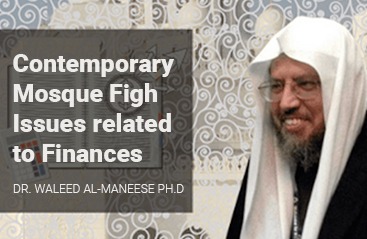
The most beloved real estate to Allah are His houses, the mosques. In non-Muslim lands, mosques play an even greater role in the lives of Muslims. Mosques in the West face a myriad of new issues that require detailed research encompassing both an understanding of the Shareeah rulings as well as the realities faced by Muslims in the West. Issues related to the finances of the mosque are among the most pressing of those contemporary issues.
Auctioning off Items Donated to the Mosque
Often a mosque receives donated items, such as women’s jewelry, that the mosque itself cannot use and which many times can become a burden upon the mosque to try to safe-keep and store. It has been customary to auction off such items in the mosque, with people usually bidding more than the actual value of the item with the intent of donating to and assisting the mosque. Many times, the purchaser turns around and donates the item again.
The Default Ruling Concerning Auctions
The majority of the jurists say that auctions are permissible, basing their view on a hadith that was narrated on the authority of Anas ibn Maalik stating that the Prophet (peace and blessings of Allah be upon him) auctioned off some items on behalf of a poor person. (Recorded by Abu Dawood, al-Tirmidhi and others.) It has also been narrated that Umar auctioned off a camel from the Zakaat camels. (Recorded by ibn Abi Shaibah.)
The Ruling Concerning Selling in the Mosque
There are hadith that prohibit selling in the mosque. The most authentic of them are: Abdullah ibn Amr stated the Prophet (peace and blessings of Allah be upon him) prohibited buying and selling in the mosque. (Recorded by Al-Nasaaee, Abu Dawood and others.) Abu Hurairah narrated that the Messenger of Allah (peace and blessings of Allah be upon him) said, “If you see someone buying or selling in the mosque, say to him, ‘May Allah not give you any profit in your deal.’” (Recorded by ibn Khuzaimah, ibn Hibbaan and others.)
Al-Shaukaani states that the majority of the scholars understand this prohibition to imply disapproval. He quotes al-Iraaqi stating that the scholars agree that if such a sale takes place in the mosque, it cannot be nullified. Al-Shaukaani notes that there is no sound evidence to understand the hadith’s prohibition above to mean simply disapproval and not forbiddance. He also notes that there is no contradiction between saying the sale is forbidden and it cannot be nullified.
In the Hanafi school, buying and selling in the mosque is “disliked bordering prohibited” in some cases and simply disliked in other cases. In the Maliki school, buying and selling in the mosque is not permitted although they permit haggling in the mosque over the price of an item already seen. The Shafiees view such an act to be disliked, unless it is done in a manner that bothers those who are praying, in which case it becomes forbidden. The majority of the Hanbalis consider buying and selling in the mosque to be forbidden while others consider it disliked. The Dhahiris consider it disliked.
Note that the jurists take into consideration the legal cause for the prohibition of selling in the mosque. Some, being the majority, state that selling in the mosque is categorically disliked with a light disapproval. Others say that it is forbidden if it is done in such a way wherein the seller sets up shop in the mosque, disturbing the worshippers, taking up needed space in the mosque, doing it on a customary basis or haggling loudly in the mosque. If those issues are not present, they consider it slightly disliked or permitted.
The ruling of the Mosque Selling an Unneeded Item that had been Donated for the Sake of Allah as a Waqf
The default ruling concerning religious endowments (waqf, items donated for the sake of Allah) is that they are not to be sold. However, it has been narrated from Umar that he permitted transferring boulders from one mosque to another in Kufah due to their being needed for the other locale. A number of fatwaas have been issued by the Permanent Committee in Saudi Arabia allowing for the sale of mosques in America that have become too small for the needs in order to buy a larger mosque. If that is the case, it must be even more permissible to use the building of one mosque as collateral in the purchase of another mosque, where the first mosque could still be used for prayers, as this would be preferred to selling the old mosque.
Ibn Taimiyyah wrote that it is permissible to change the conditions of a religious endowment if an alternative is more suitable, such as changing the recipients of an endowment from the poor to jihad due to need. Similarly, ibn Uthaimeen stated that if a mosque is no longer in need of its furniture, it may give that furniture itself to another mosque if possible. Otherwise, it may sell the furniture and use the proceeds for the mosque.
Conclusion
Based on the above, it is permissible to auction off in the mosque a donated item as long as the proceeds go to the mosque or a charitable organization that will benefit Muslims. The following conditions must be adhered to: voices should not be raised above what is needed; it should be done at a time in which it will not disturb those offering prayers; it should not be done often such that the mosque becomes a place for people to purchase things of this worldly life, with the mosque thus losing its essential purpose of being a place of prayer and remembrance of Allah; the item auctioned must have been donated for the sake of mosque and the mosque is not in need of it, such that it would be more beneficial to benefit from its price.
Ruling Concerning the Mosque Keeping a Portion of the Funds Raised During a Guest Fundraising
At one time, many activities were fulfilled by people volunteering their time and money. As needs grew, charitable organizations hired individuals and paid them salaries based on the hours they worked. That was acceptable. Eventually, a new practice developed wherein the individual doing the fundraising would be paid a percentage of the funds that he raised. This has led to, essentially, professional fundraisers who sometimes use heavy-handed tactics to put pressure on possible donors or who drag on fundraising sessions until they reach a specific amount.
Ibn Uthaimeen stated that it is impermissible to announce that one will collect for a certain cause and then to keep a portion of what was raised for that cause. Both ibn Baaz and ibn Uthaimeen were of the view that those who work to collect donations do not fall under the category of those “employed for the sake of collecting zakat.” Al-Munajjid said that the people who run charitable organizations are nothing more than trustees and that it is not allowed for them to use the donations except for the purpose for which they were donated. He says that some organizations keep as much as eighty percent of what they collect—how could that be permissible, he asks.
Other contemporary scholars hold that those who work for such organizations can be considered among those “employed for the sake of collecting zakat.” They also say that there is no difference between a fixed wage or a percentage of earnings paid. Zakaat, of course, is stricter in its rulings and therefore it should be even more so permissible to use such funds for those who collect voluntary donations. Additionally, it is not necessary to inform the donators of this fact as the Prophet (peace and blessings of Allah be upon him) did not inform those who paid zakat how their zakat would be distributed.
Shaikh Haani Abdullah al-Jubayir, a judge in Makkah Judicial District, said that it is permissible for those in charitable organizations to receive a salary for their services which comes from the donations, as long as there is a need for that person’s efforts. He says that receiving a fixed share is better than receiving a fixed salary. It is permissible in the Shareeah and ibn al-Qayyim has argued that it is more just. The Prophet (peace and blessings of Allah be upon him) allowed the Jews to stay in Khaibar on the condition that they would share the proceeds of the date gardens.
On islamweb there is a fatwaa from Shaikh Abdullah al-Faqeeh in which he states that such sharing of the donations is permissible if the work could not be achieved without it and if it is done to the extent it is needed. He also stated that it is not a must to inform the donators of this.
In my opinion, it is safest, if one is not able to find a volunteer for that work, to hire someone with an appropriate monthly salary. If it is permissible to set aside a portion of the proceeds for the fundraiser, it must be even more so permissible to give a portion to the host mosque to cover its cost, so that it will remain open to such fundraisers for charitable organizations. However, the percentage has to be known. If the donators would be informed of this arrangement it would be good as knowing that does not usually prevent them from donating.
Ruling of Delaying, due to Need or Benefit, the Distribution of Zakaat al-Fitr that was collected via the Mosque; Does Zakaat al-Fitr require its own Account or Can it be Joined with the General Charities Account?
The default is that it is not allowed to delay Zakaat al-Fitr beyond its appropriate time, which ends at the time of the Eid Prayer according to some or by sunset on the Day of Eid according to others. The zakat must be handed over to the poor or to the poor’s representative by this time. If it is given by this time to the poor’s representative, the obligation is fulfilled even if the representative takes some time handing it over to the poor. The mosque or charitable organizations which collect zakat al-fitr are the representatives of the poor. Hence, once the zakat is handed over to them, the obligation is fulfilled. It is acceptable for the representative to delay in distributing the zakat if there is some need or benefit to doing so.
Zakaat al-Fitr must have its own account since its recipients are a specified group.
Is it Necessary to Give Zakaat al-Fitr in Food given the Hardships that that Creates for the Islamic Centers?
Most of the Imams are of the view that it is not permissible to simply give the value of zakat al-fitr. This view is due to the hadith narrated by Abdullah ibn Umar, “The Prophet (peace and blessings of Allah be upon him) enjoined the payment of one saa’ of dates or one saa’ of barley as zakat al-Fitr on every Muslim, slave or free, male or female, young or old. He ordered that it be paid before the people went out to offer the Eid Prayer.” (Recorded by al-Bukhari and Muslim; this is Muslim’s wording.)
Ibn Taimiyyah noted that Abu Hanifah allows the paying of the value of the food under all circumstances while al-Shafiee forbids that under all circumstances. A third view is that it is allowed if there is some pressing need for it. This third view has been narrated from Ahmad even though Ahmad believes that the default is that it is forbidden to simply give its value.
What is apparent to me is that it is permissible to pay the value of the zakat rather that in foodstuff, especially if there is a need to do so or some hardship in storing, transporting and distributing the foodstuff.
Is it Permissible to send Surplus Zakat al-Fitr to Another Country via a Charitable Organization or must it Remain Domestic?
The Permanent Fatwaa Committee of Saudi Arabia and Shaikh ibn Uthaimeen said that it is permissible to send zakat al-Fitr to another country if, for example, there are no Muslims in one’s land or no poor Muslims in one’s land.
Is it permissible to “borrow” from the Mosque’s General Account to Distribute Zakaat al-Fitr before Zakaat al-Fitr, Given that a Large Number of the Residents Pay it before the Prayer?
Most scholars say that it is not permissible to pay zakat al-fitr on somebody else’s behalf without their consent. Thus, it would not be allowed to advance funds from the general account, distribute that and then repay the general account when the money from the zakat al-fitr collection comes in. This is not allowed even if it causes a delay in the distribution of the Zakaat.
Most scholars say that it is not permissible to pay zakat al-fitr on somebody else’s behalf without their consent. Thus, it would not be allowed to advance funds from the general account, distribute that and then repay the general account when the money from the zakat al-fitr collection comes in. This is not allowed even if it causes a delay in the distribution of the Zakaat.
However, I think it would be permissible for the mosque to announce that it is willing to act on the people’s behalf with their permission. They could then make a list of those people, distribute the zakat on their behalf from the general fund and then receive the money from them later.
Holding a Fundraiser During the Friday Khutbah
It seems that this would be forbidden as it takes away from the goal and purpose of the Khutbah. It would also lead to people stepping over the worshippers to distribute the fundraising material and this act of stepping over others during the Friday Prayer is forbidden.
As an alternative, there is no harm in the Khateeb asking for donations during the khutbah but then not being collected until after the Khutbah. Alternatively, they could have the fundraising before the khutbah begins.
Collecting Donations Between the Khutbah and the Beginning of the Prayer and Passing a Collection Box between the Worshippers when the Imam Sits between the Two Khutbahs
There are three opinions among the scholars concerning speaking after the Khateeb ascends the minbar and before he starts his khutbah and after he finishes his khutbah and before he begins the prayer.
One opinion is that it is permissible at both times. This is the view of the Malikis, Shafiees, Hanbalis and some Hanafis. It is based on a report from the time of Umar and that the hadith from the Prophet (peace and blessings of Allah be upon him) explicitly mentioned to be silent, “While the Imam is delivering the khutbah.” A second opinion is that it is not permissible to speak during either of those times. This is the view of Abu Hanifah. It is based on the hadith, “If you tell your companion, ‘Be quiet,’ on Friday while the Imam is delivering khutbah, you have spoken inappropriately.” A third view is that it is only disliked during both of these times to speak. This is the view of some of the Hanbalis, with one fatwaa from Islamweb stating that it is permissible to speak during these times, as the Imam is not delivering a khutbah during said time.
Based on the above, it is apparent that there is no prohibition of collecting donations while the Imam is sitting between the two khutbahs provided that it does not take long for, as ibn Qudaamah noted, it is one of the conditions of correctness of the khutbah that there not be any uncustomary long breaks between any of its parts.
Using Zakaat Funds to Build, Maintain or Decorate Mosques
The four schools of fiqh and the majority of the scholars are of the opinion that the category of zakaat described as “for the sake of Allah” refers to the mujaahideen who do not receive a sufficient stipend for their services. The Hanbalis add those who are making the obligatory hajj to this category. Al-Raazi in his Quranic commentary notes, however, that there is nothing to restrict “for the sake of Allah” simply to the mujaahideen. He says that al-Qaffaal has quoted this from some jurists, stating that the money can be used to shroud the deceased, build mosques and so on. This is also the view of al-Qaasimi, Muhammad Rasheed Ridhaa, and Siddeeq Hasan Khan.
It is safest to only use voluntary donations for building and maintaining mosques. Zakaat funds should only be used in cases of dire necessity. Some scholars expand the understanding of jihad to include jihad with the tongue and dawah to Allah. If an Islamic Center in the West is participating in those activities, it is permissible for it to receive zakat funds. Some scholars also say that if the mosque is in debt it may receive zakat funds under the category of “those in debt.” As for overly decorating mosques, this is disliked and therefore charity, even voluntary charity, should not be used for it.
Investing Surplus Mosque Funds for the Benefit of the Mosque
If the mosque’s surplus money comes from the obligatory zakat, the strongest opinion is that it cannot be invested, due to the rights that are upon that money.
If the money is the result of people donating it to the mosque as a type of waqf, then their permission needs to be sought before investing those funds.
If the funds were voluntary donations given to the mosque, in my view, the matter is flexible if they were not given any specific requests as to how to use that money. If the directors of the mosque find that it will be more beneficial for the mosque to invest that money, they may do so.






